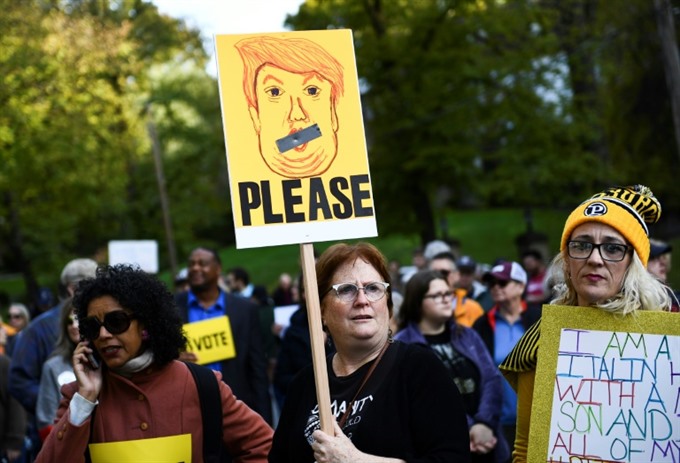 World
World

President Donald Trump further hardened his pre-election anti-immigration rhetoric in a Florida campaign stop on Wednesday, after threatening to deploy as many as 15,000 soldiers on the Mexican border -- equal to the size of the US contingent in Afghanistan.
 |
| A firestorm of protest raged around US President Donald Trump’s visit to Pittsburgh, Pennsylvania on October 30, following a deadly anti-Semitic massacre. – AFP/VNA Photo |
FORT MYERS, United States — President Donald Trump further hardened his pre-election anti-immigration rhetoric in a Florida campaign stop on Wednesday, after threatening to deploy as many as 15,000 soldiers on the Mexican border -- equal to the size of the US contingent in Afghanistan.
"They got a lot of rough people in these caravans. They are not angels," he said in Fort Myers, referring to migrants from poor Central American countries moving towards the United States in hopes of a better life or to escape violence.
"We’re gettin’ prepared for the caravan, folks," he said.
Brushing aside accusations that his divisive rhetoric on immigration is stoking extremism, Trump made the troop announcement before flying to Florida for the last stage of campaigning ahead of next Tuesday’s midterm elections.
He will host 11 rallies across eight states in the next six days.
Trump hopes to fire up core Republican voters and spur the party to retain dominance of both chambers of Congress. Democrats are threatening to light a fire under Trump’s feet if they win even partial control, raising the specter of ever more brutal Washington politics.
At the core of Trump’s message to his raucous, adoring supporters is the now near daily warning that America is literally under attack from an "invasion" of illegal immigrants and that Democrats would throw open the borders.
On Tuesday, Trump announced that more than 5,000 active duty soldiers were being sent.
That was already highly unusual, but on Wednesday, he told reporters at the White House: "We’ll do up to anywhere between 10 and 15,000 military personnel."
Trump frequently describes illegal immigrants -- a tiny minority of whom have formed groups to attempt walking hundreds of miles to the US border – as "rapists" and "thugs."
"It’s a dangerous group of people," Trump said of the latest group of a few thousand migrants, who are still deep inside Mexico far from their goal.
"They’re not coming into our country."
The situation, according to the Department of Homeland Security, is "an unprecedented crisis."
However, the department’s own figures show that the number of illegal immigrants intercepted in 2018 was only 400,000, a mere 25 percent of the 1.6 million figure in 2000.
Guns, bombs
The president has reveled in his anti-immigrant rhetoric for months.
At his "Make America Great Again" rallies, like the one in Florida on Wednesday, Trump leads supporters in chanting "build the wall" -- a reference to his so-far unrealised dream of erecting a partition along the entire US-Mexican frontier.
But the nationalist -- or what critics say is the racist-tinged – policy was engulfed in deep controversy last week when an alleged anti-Semitic fanatic gunned down 11 people in a Pittsburgh synagogue.
According to US news reports, the shooter had taken inspiration from Trump’s speeches in his stated desire to fight for white people. Similarly, a Florida man arrested last week on charges of mailing homemade bombs to more than a dozen Trump opponents was an ardent supporter of the president.
The alarming escalation of extremist politics threw Trump on the defensive, with opponents claiming that he had helped create an atmosphere in which the two attackers felt comfortable to carry out their plans.
On Tuesday, Trump made a politically tricky visit to Pittsburgh, accompanied by his wife Melania, Orthodox Jewish son-in-law Jared Kushner and daughter Ivanka.
Trump played the traditional presidential role of healer-in-chief at the Tree of Life synagogue, laying memorial stones and spending more than an hour at a nearby hospital with the widow of one of the slain.
The experience was "very humbling and very sad," Trump said.
Opponents and noisy groups of local protesters said, however, that he shouldn’t even have come.
Starkly illustrating the controversy, there wasn’t anyone available, beyond the local air force base commander and his wife, to meet the president on arrival from Washington.
Pittsburgh’s mayor was among those who suggested that Trump stay away.
Brushing off, doubling down
White House spokeswoman Sarah Sanders pointed out that Trump "was also asked to come by some" and insisted that he’d gone to "represent the country in this moment."
Certainly Trump was back in fighting mood on Wednesday, tweeting that he and Melania "were treated very nicely yesterday in Pittsburgh."
"Small protest was not seen by us, staged far away," he said. "The Fake News stories were just the opposite-Disgraceful!"
He then explored his latest eye-catching plan for curtailing immigration: removal of a constitutionally protected right to citizenship for anyone born on US soil.
The automatic right, which is also given in neighboring Canada and Mexico, has been criticised as outmoded, providing a loophole for the children of illegal immigrants.
"The World is using our laws to our detriment. They laugh at the Stupidity they see!" he tweeted.
However, the nature and timing of Trump’s proposal -- first aired on Tuesday -- has been controversial, particularly given his insistence that he can personally overrule something so far protected by the constitution. — AFP




